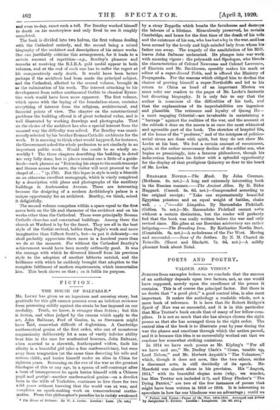FICTION.
THE HOUSE OF BALTAZA R.*
Mn. LOCKE has given us an ingenious and amusing story, but gratitude for this gift cannot prevent even an indolent reviewer from protesting mildly against the strain he has imposed on our credulity. Truth, we know, is stranger than fiction ; but this is fiction, and when judged by the canons which apply to the art, John Baltazar, Fool of Genius, is, as Stevenson might have 'aid, somewhat difficult of deglutition. A Cambridge mathematical genius of the first order, who out of monstrous magnanimity deliberately let a man of vastly inferior ability beat him in the race for academical honours, John Baltazar, when married to a shrewish, featherpated widow, finds his affinity in a beautiful girl (also a fine mathematician), but runs away from temptation (at the same time deserting his wife and unborn child), and buries himself under an alias in China for eighteen years. Returning on the eve of the war as the greatest Sinologue of this or any age, in a spasm of self-contempt after a bout of intemperance he again buries himself with a Chinese pupil and protege—another mathematical genius—on a derelict farm in the wilds of Yorkshire, continues to live there for two solid years without knowing that the world was at war, and completes an epoch-making work on transcendental mathe- matics. From this philosopher's paradise he is rudely awakened • The Rouse of Ballaaar. By W. J.. Locke. London : Lane. [7e. net] by a. stray Zeppelin which bombs the farmhouse and destroys the labours of a lifetime. Miraculously preserved, he revisits Cambridge, and hears for the first time of the death of his wife and the existence of his sou, who has lost a leg in the war. and has been nursed by the lovely and high-minded lady from whom his father ran away. The tragedy of the annihilation of his MSS. leaves John Baltazar undaunted. He plunges into war work with amazing vigour : the polymath and Stiologne, who blends the characteristics of Colonel Newcome and Colonel Lawrence, of Einstein and Mr. Backhouse, speedily makes his mark as editor of a super-Bound Table, and is offered the Ministry of Propaganda. For the reasons which obliged him to decline the chance of proving himself a super-Northcliffe and led to his return to China as head of an important Mission we must refer our readers to the pages of Mr. Locke's fantastic but diverting biography. It is only fair to say that the author is conscious of the difficulties of his task, and that the explanations of its improbabilities are ingenious and plausible. The reticence and loyalty of Quong Ho- e most engaging Celestial—are invaluable in maintaining a " barrage " against the realities of the war, and the account oi the solitude d deux on the moors is at once the most whimsical and agreeable part of the book. The sketches of hospital life, of the home of the "profiteer," and of the intrigues of politico- social sirens are done with spirit, but they do not show Mr. Locke at his best. We feel a certain amount of resentment, again, at the rather unnecessary decline of the soldier son, who begins so promisingly, into a fatuous philanderer, though his indiscretion furnishes his father with a splendid opportunity for the display of that prodigious Quixotry so dear to the heart of Mr. Locke.


































 Previous page
Previous page